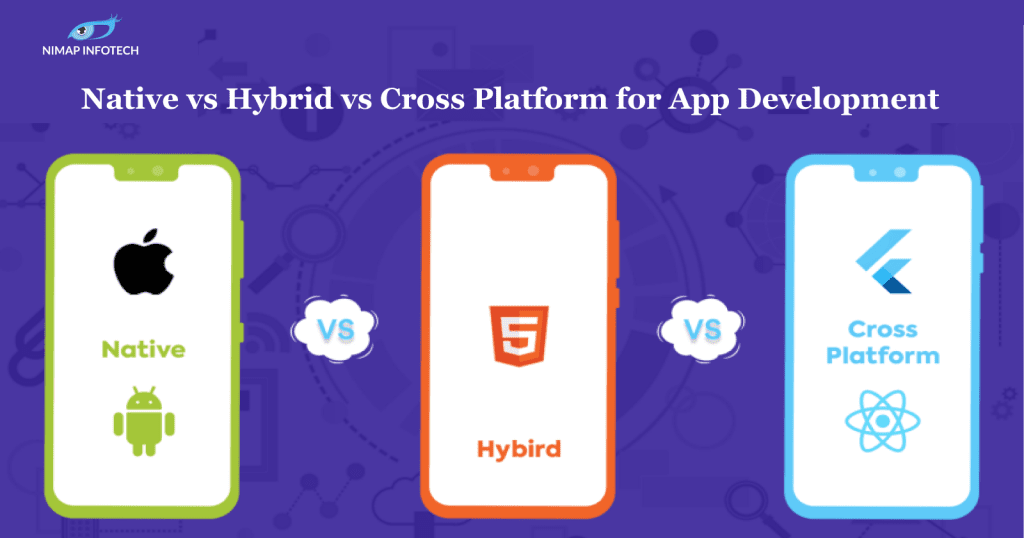Table of Contents
ToggleNative vs. Hybrid vs Cross Platform for App Development
In this digital age, our lives have become confined to digital assets;. We make the most crucial decisions of our lives and businesses using the Internet and Mobile apps. With countless apps currently available on the Play Store and App Store. With limited exposure, skills, resources, and budgets. It is difficult for businesses to compete in the digital landscape.
In this blog, we have tried to cover the 3 main and major approaches to Mobile App Development. That is, Native vs Hybrid vs Cross Platform, so you’ll find the solution to this dilemma.
During a stiff competition, businesses must emphasize quality, precision, functionality, and other parameters. To convince potential customers to use their services over their competitors. Hence, at this point, businesses face a number of dilemmas. Such as selecting the right technology for mobile app development services. Choosing iOS or Android, or selecting the best framework to attract a wide variety of customers.
Overview of the Mobile App Development Market
The estimated downloads in the year 2020, is approximately more than 247 billion globally. In the upcoming year, the expected app downloads is to reach 299 billion.
The revenue generated by mobile apps via paid downloads and app advertising. Is expected toreach around 935 billion US dollars by 2023.
According to recent statistics, by 2025. There will be 187 billion mobile app downloads from the Google Play store. Compared to 109 billion app downloads in 2020.
Native vs Hybrid vs Cross Platform App development techniques have been a source of confusion. Especially for new programmers, due to this never-ending passion for smartphone apps.
There are several options for providing a mobile app development experience to your users. And it doesn’t just require building a native app.
Businesses have many options today, including hybrid development. Utilizing web technologies and browser rendering or using cross-platform development tools. like React Native or Flutter for cross-platform development.
What Exactly Is A Native App?
Apps developed through native are designed for a specific platform that use native OS, and use a programming language tailored specifically for that platform.
Because native development is done for a particular platform. Developers can make use of device-specific. Software and hardware, which improves the user experience. Developers use specific coding languages for each platform.
Native Android apps, for example, are built using Java, whereas iOS apps are developed using Objective-C or Swift. Native apps are preferred because of their exceptional performance. However, native development dissuades organizations due to its high cost. The significant difference between native & hybrid app development is the total amount spent.
Pros of Native Apps
- High Speed and Offline Capability
- Bugs are unlikely to occur.
- More instinctive & cohesive
- Increased safety
- Outstanding accomplishment
The Benefits of Native Development
- Stable Operation.
- Simple Insect Prevention.
- API Accessibility is Excellent.
- Durable Performance with Simplified Coding.
- Enhanced Customer experiences due to customized UI.
- The layout is unique and compliments the screen ratios.
When Is Native Development the best bet?
Considering native development for your project implies twofold team, cost, and time commitments. So if you are not in a hurry to get your business app out there and do not have financial constraints, then the Native app would be a good choice. While Native apps aren’t as quick as other apps. In terms of security, user-friendliness, or speed, one thing is certain: Native apps are a great investment in the future.
What is Hybrid Mobile Application Development?
A hybrid mobile app involves building a web-based mobile app. In which the core solution is a web-based application that is embedded in a native mobile app. Web development languages such as HTML, CSS, and JavaScript are used to create the core programs. This is then embedded into native apps using plugins.
Hybrid apps are web applications built with embedded browser-like configurations inside native apps. Using plugins that act as a bridge for web code to leverage native app capabilities. Thus, As part of the native app environment, hybrid app content is displayed using WebView on Android and WKWebView on iOS.
Pros of Hybrid
- The rate of development. It is quicker than cross-platform frameworks like React Native in many aspects.
- One codebase. The pinnacle of cross-platform code reuse.
- Reusable. Reuse libraries & design systems that you already have.
- Intimately acquainted. Web developers may utilize the same technology/language that they are already familiar with.
- Customization options. Edit the UI till you’re satisfied.
- Deployability. Use it as a web, mobile, or desktop app (using Electron).
When Should You Consider Creating A Hybrid App?
It is possible to use hybrid app development as a pilot solution for surfacing startup businesses. Due to its high development speed and cost-effectiveness. Hybrid app development has become a perfect solution for startups. Furthermore, if UX is not the priority for your application, then hybrid app development is the better option.
Furthermore, you should use a hybrid app if you wish to distribute your web apps all over the App Stores. If you wish to reach a wider audience by making the app accessible on both mobile and desktop devices.
Also Read: The Ultimate Guide to Cross Platform App Development
What is Cross Platform App Development?
In the business, there is significant confusion about cross-platform & hybrid app development. In reality, they are very different.
Furthermore, Cross platform app development works by creating code. That can be reused and shared across many platforms. Allowing for the development of apps across multiple operating systems.
It combines the notion of producing a single piece of code that may be reused across platforms. Significantly reducing development work and expense.
Pros of Cross-Platform Apps
- Easy and quick development & Cost-effective
- The code could be reused.
- Product upkeep is high.
When Should You Consider Creating Cross Platform Application?
It is imperative that businesses target audiences across multiple platforms simultaneously. So cross-platform app development is an ideal solution. If your company needs satisfactory app performance on a limited budget. Getting a native-like look at an affordable price without having to choose a long native app development is a good solution.
What Should You Choose: Native vs Hybrid vs Cross Platform for App Development?
As a company, one needs to see the next step, for all three popular mobile app development substructures. Well, no matter whether you choose a hybrid, native or cross-platform. It all depends on your project demands, your budget, your target market, and several other factors. When the topic of Native vs Hybrid vs Cross Platform apps is discussed, it becomes hard to pick a winner.
However, there are a few factors. That helps us distinguish between Native, Hybrid, and Cross-platform development.
- App Performance
Compared to hybrid, native and cross-platform app development is the best option when it comes to performance. With native app development, you will be able to explore new mobile phone features. In a straightforward way, such as wireless access points, networks, and more. All while optimizing the delivery process and the overall app performance. Hence, Native app development is the clear winner when it comes to performance.
- UX and UI
Statistics indicate that around 38 percent of mobile app users retain their app after their first experience. Meaning nearly one in three people abandon them after their first use. Moreover the, UI and UX of native apps make them stand out, with better scrolling, dynamic animations, and other appealing elements. If we compare cross-platform development vs native development, the former lags behind.
- Market
In a market where competition is fierce, businesses are working hard to get their app on the App Store and Play Store as soon as possible. It takes enough time for native apps to develop their lifecycle. When compared to cross-platform, native, and hybrid platforms. As they speed up the time to market, hybrid and cross-platform apps are worth considering.
Native vs Hybrid vs Cross Platform
| Features | Native | Hybrid | Cross Platform |
Codebase | Codebases are Separate, one per platform | It is a single codebase featuring platform-specific capabilities | It is a single codebase featuring platform-specific capabilities |
Debugging | Native debugging utilities | Debugging tools for native +web development | It is dependent on the framework* |
Libraries | There is less reliance on open-source libraries and platforms. | Highly reliant on several libraries and frameworks | Highly reliant on several libraries and frameworks |
Tools | XCode, AppCode, Android Studio | Ionic, Apache Cordova, Visual Studio | React Native, Xamarin, Flutter |
Read More: Reasons to Choose Flutter for Cross Platform App Development
Conclusion
Business owners need to choose a mobile app development approach. Which is perfect and suits their business nature, requirements, and customers’ expectations. Regardless of the industry they are in.
Based on your budget, timeline, audience, and product, you will have to choose between Native vs Hybrid vs Cross Platform. You might need help, so look no further than Nmap Infotech. We have prominent mobile developers who will help and suggest the required technologies for your apps. Complex coding or rather simple ones. This will allow us to streamline the app requirement. With your business goals and objectives by determining the features and hardware requirements. All this if you wish to incorporate it into your application.
Businesses must determine their needs to develop a robust yet modern-age app. Once they have determined their needs, they can explore the appropriate development platform to meet them all.
Each of the alternatives to native, hybrid, and cross-platform has its own pros and cons. The key is to consider the bigger picture and understand the objectives you are trying to achieve with the app before deciding.
With this information, you’ll definitely be able to develop a modern yet engaging mobile application. In the market and ultimately reach the heights.
Author
-

A technology enthusiast with over 14+ years of hands-on experience in the IT industry, I specialize in developing SaaS applications using Microsoft Technologies and the PEAN stack. I lead a team of 300+ engineers, holding multiple Microsoft certifications (MCSD, MCTS, MCPS, MCPD). My expertise spans across C#, ASP.NET, NodeJS, SQL Server, and Postgres.
View all posts








